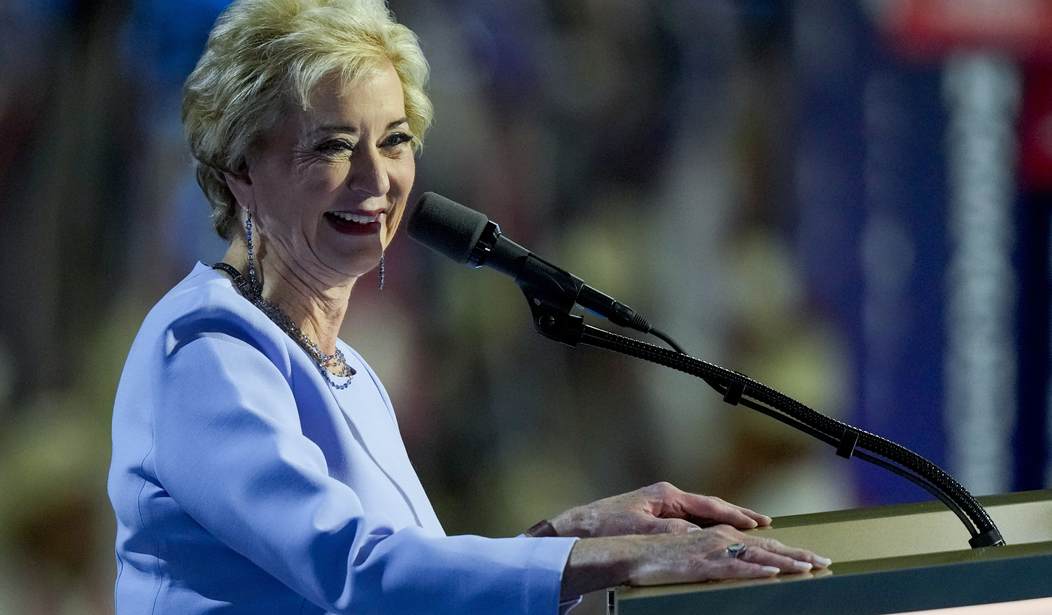This week has been a big one for education as many await what could be a massive overhaul now that Donald Trump has completed his astonishing comeback. DC wonks, educators, and teachers no doubt wait on tenterhooks to learn if Trump will fulfill his promise of dismantling the Department of Education.
But even if Trump v.2 significantly loosens federal control of America’s schools, the question of foreign influence and intrigue, both in the K-12 and university systems, will remain (there’s been, after all, a significant amount of money changing hands, a chunk of it unreported). The debate over how to fix it is likely to become a little more local.
Some questions about how the Trump administration views this problem were answered with the announcement Tuesday of Linda McMahon as Trump’s pick for Secretary of Education. And it is a problem McMahon will face, one feeding everything from anti-American sentiment to outright antisemitism, and one that enriches universities even as researchers are manipulated into becoming foreign agents all while schools are paid handsomely to serve as conduits to power.
McMahon, who’s been the board chair of the America First Policy Institute (AFPI) – an organization teeming with Trump loyalists whose C4 arm had a hand in helping Trump win – served as the administrator of the Small Business Administration during Trump’s first term. She will almost certainly be confirmed to lead DoEd. AFPI’s web page on the problem of foreign funding of universities and an X post from the organization Wednesday morning offer an idea of how McMahon might view the issue when she assumes her role in the agency. The X post reads:
“Antisemitism isn’t just a Jewish issue; it’s a symptom of a toxic ideology spreading through our universities. The same woke worldview that pits oppressors against the oppressed is fueling this dangerous narrative. We must confront this bigotry head-on! It’s time to stand up for truth and fight back against the hatred permeating higher education.”
Recommended
So what does this mean for a federal agency that, if Trump has his way, will either go away entirely or go back to being a small unit within a larger agency, as it was before 1972, while the states oversee the provision of federal education funds locally?
It almost certainly means that, much like the provision of funding, the question of how to deal with foreign influence in schools will become more of a state and local problem, with some help from Congress.
Congress could start by reupping and passing the DETERRENT Act. The legislation, passed in the House last year, should ideally move through and pass in a new GOP-led Senate. Put simply the DETERRENT Act:
– Slashes the foreign gift reporting threshold for colleges and universities from $250,000 down to $50,000, with an even stricter $0 threshold for countries and entities of concern.
– Closes reporting loopholes and provides transparency to Congress, intelligence agencies, and the public. Requires disclosure of foreign gifts and contracts to individual staff and faculty at research-heavy institutions to protect those targeted the most by our adversaries.
– Holds our largest private institutions accountable for their financial partnerships by revealing concerning foreign investments in their endowments.
Brian Cavanaugh, Senior Vice President at American Global Strategies, a firm that advises Fortune 100 businesses on critical infrastructure and supply chain security, and a visiting fellow in the Border Security and Immigration Center at The Heritage Foundation, notes that addressing foreign influence in education is “inherent to managing national security.”
“The federal government has, in some ways, failed to brief the states on the threat assessment” of influence operations targeting education. “Foreign adversaries love to take advantage of our system of government,” he says. “The DETERRENT Act will provide the teeth lacking in The Higher Education Act and The Foreign Agents Registration Act (FARA) where the right people are simply not getting the information.”
The DETERRENT Act was applauded when it passed the House late in 2023 by Sen. Thom Tillis (R-NC), who touted a companion act in the Senate, although the legislation failed to move quickly in that chamber.
While the states wait for federal legislation demanding transparency and accountability, they’ve begun to pass state-based legislation to address the problem closer to home. States like Alabama and New York have introduced bills aimed at curtailing influence operations on campus, including barring the acceptance of gifts from terror-supporting countries.
Other states have begun to explore state-level FARA bills that could, according to Michael Lucci of State Armor, potentially close reporting loopholes related to universities and lobbying that exist in the federal legislation.
“The state of Florida has done all that and more,” Lucci says, referring to a 2023 bill that gives the state oversight of universities’ relationships with “countries of concern.”
“The issues surrounding foreign adversaries and education are a point of agreement [across the political aisle],” Lucci says. “It’s a fairly popular idea that universities have gone too far, that the espionage and influencer operations are real. There is an openness to fixing the problem.”
McMahon and Trump, with the help of Congress, have the opportunity to address a national security problem while both reaching across the aisle and engaging in a bit of federalism, all at the same time. Those unicorns rarely happen in politics. Trump and Co. should try to lasso it.

























Join the conversation as a VIP Member